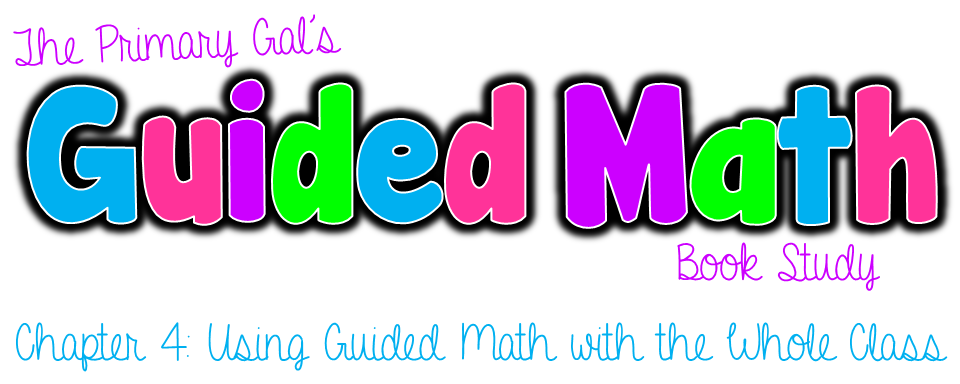Chapter 4 was an easy read and is something that all of us are familiar with- Whole class instruction. What I've come to love about this book is that it isn't focusing JUST on small groups- it's really addressing the whole math class, from top to bottom.
There is a place and time for everything--including whole group instruction-- and this chapter focuses on activities that are most appropriate for whole group.
When should I use whole group?
- presenting mini lessons
-involving students in activating strategies
- reading aloud math-related literature
- setting the state for math workshop
- conducting a Math Huddle ( math debriefing, discussing new ideas or misconceptions)
- providing practice and review
- format testing or assessments
Much of the chapter pages are spent reviewing each of these topics in detail. Whole group instruction doesn't necessarily need to happen daily, but it could in small chunks. Before dismissing children into math workshops (student lead- small group, partner, or individual activities), for example, you'd probably want to do a bit of review with students on big ideas and concepts, rules, activity previews, etc. Other school days may need more time in whole group- like when you're reading a math-related book, playing a whole-class review game, or conducting an assessment.
There are also a few drawbacks to whole group instruction.
- difficult to differentiate and meet the needs of all learners
- less opportunities for children to discuss mathematica ideas with peers
- difficult to give quality feedback with each individual student
Here are a few samples of some of my favorite activities for whole group instruction:
-Splat games are great for whole group or small group! As a whole group activity, students are divided into teams, each with one fly swatter. The caller calls out one clue. Students with the fly swatter must be the first to swat the matching card!
Want to test SPLAT out for yourself? Grab a sample by clicking here!
Want to see all the variations?
Another favorite game of mine is one I just recently created- Noggin' Bandz!
Noggin' Bandz is a fun whole-group game where students give their peers clues about a math vocabulary word. A selected student will come to the front of the class and wear the "Noggin' Bandz" headband. Without the child looking, the teacher will place a vocabulary card on the headband. Other students will give clues using mathematical vocabulary or real world examples!
There are currently 9 different editions of the
Noggin' Bandz game!
I prefer a math week that looks like the following:
You'll notice that I've specifically designated Mondays and Fridays as my whole group instruction days. That isn't to say that I don't spend time whole group on Tuesday, Wednesday, and Thursday-- I do, but it's in the form of a mini lesson, daily number sense routine, setting the stage for successful math stations, or reviewing a bell ringer or exit ticket.
Math tasks are an important part of EVERY math class, and I think setting time aside to do them is important. For Fridays, I like a schedule like this:
I've left the times off, as those times vary depending on the task that day. I do, however, try to stick to the 5 minutes of struggle time, as any more than that could be come overwhelming for young students. While the entire task isn't completed using whole group instruction, I think it's an important component of the process. Students find it interesting and helpful to hear what their peers have to say about the task at hand!
That's it for this week! I'll see you next week, where we'll discuss small groups!












I love that they include math literature in this section! It is a great way to engage students and tie in literacy!
ReplyDeleteTara
The Math Maniac
Thanks for the game ideas. Great!
ReplyDeleteBeth
Thinking of Teaching